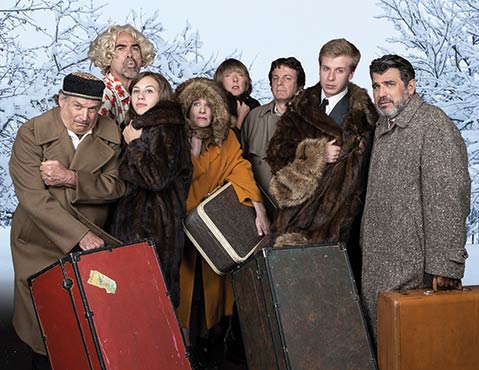Preview: The Cherry Orchard
Lit Moon Takes On Chekhov

For serious theater fans, the great dramas of Anton Chekhov — The Seagull, Uncle Vanya, Three Sisters, and The Cherry Orchard — are absolutely essential plays representing the highest pinnacle of achievement in the dramatic arts. For nearly everyone else, especially in the English-speaking world, they are mystifying riddles widely known to induce outbreaks of “maybe I just don’t get theater” syndrome. People with complex, similar-sounding double names and other nicknames gather and talk for three hours. Curtain.
While it’s not necessarily quite that bleak, even experienced directors understand the need to do something special in order to bring what Chekhov’s contemporary Leo Tolstoy described as “a theater of mood” to life on the American stage. For Lit Moon Theatre Company’s John Blondell, who is directing The Cherry Orchard in a production that will be performed at Westmont’s Porter Theatre this weekend, September 4-6, the trick is “to maintain the humor but keep it character driven.”
The director and his cast have been meeting for intensive rehearsals separated by long breaks over the last year. This “hothouse” approach to preparing Chekhov is similar to the process used by André Gregory and Wallace Shawn in developing the production that would become the 1994 Louis Malle film Vanya on 42nd Street.
What is it about Chekhov that attracts actors and directors to work on his plays in this extraordinary way? As with the classical repertoire in music, performers feel that focused repetition of these works over time offers them an ever-deepening sense of what’s implicit, which, for the introspective Chekhov, was nearly everything. Vicky Finlayson, who plays the thwarted matriarch Madame Lyubov Andreyevna Ranevskaya, told me that her character is “a loving woman making this voyage home to find a purer version of herself,” thus providing a beautiful example of where working on Chekhov in this way can take the experienced actor in terms of character analysis.
The story revolves around Lyubov Andreyevna losing her family’s country estate and its beloved cherry orchard to overwhelming debt, and it reflects a crisis in Russian society that followed the emancipation of the serfs in 1861 and that didn’t resolve until the Bolshevik Revolution of 1917 — if then. By presenting the waves of social disorder that surround the transfer of just one heavily mortgaged rural property, Chekhov captures a galaxy of social types, both residual and emergent. Faithful retainer Firs yearns for the good old days when masters and men knew their respective places, while the self-made Lopakhin, who buys the farm and chops down the orchard, bickers with a skeptical intellectual, Trofimov, and a sketchy servant, Yasha, yet retains the love and admiration of the woman whose legacy he acquires and immediately, to her mind, destroys.
As part of their work on the play, the cast shared their own stories of going back to the homes in which they grew up. “Every actor had a story,” reported Finlayson, whose parents live on a 17-acre apple farm in Wilton, New Hampshire. “Yes, they have an orchard, and no, I did not grow up there,” she said, “but I have an organic garden of my own, and through that experience, I feel I can understand something about Chekhov’s connection with his fruit trees.” The tide of feeling that arises whenever people anywhere consider questions of property, prosperity, and fair land use is something we can all identify with in 21st century California, and returning with Lit Moon to Chekhov’s The Cherry Orchard is one richly rewarding way to reflect on it. You can go home again, it seems, but you can’t go back to the same home twice.
4·1·1
Lit Moon’s The Cherry Orchard will be at Westmont’s Porter Theatre Thursday through Saturday, September 4-6. For tickets and information, go to westmont.edu/boxoffice or call 565-7140. Looking ahead just one week, Lit Moon presents Hamlet at Center Stage Theater on September 12 and 13.



